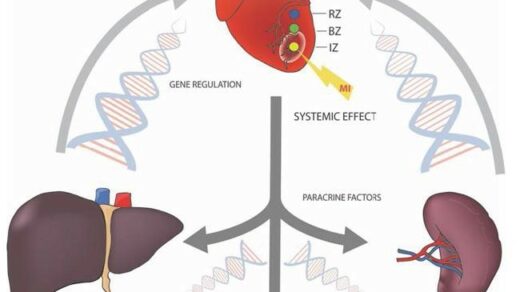Read short summaries of the latest oncology-focused research published in this week’s issue of Oncotarget, Volume 12, Issue 21.

Oncotarget’s Volume 12, Issue #21
New Publications
Cover (Priority Research Paper): ATR inhibition reverses the resistance of homologous recombination deficient MGMTlow/MMRproficient cancer cells to temozolomide
Origin: Maryland, United States
Institutions: Frederick National Laboratory, National Institutes of Health
Quote: “The therapeutic efficacy of temozolomide (TMZ) is hindered by inherent and acquired resistance. Biomarkers such as MGMT expression and MMR proficiency are used as predictors of response. However, not all MGMTlow/−ve/MMRproficient patients benefit from TMZ treatment, indicating a need for additional patient selection criteria.”
Research Paper: Hyperprogression of a mismatch repair-deficient colon cancer in a humanized mouse model following administration of immune checkpoint inhibitor pembrolizumab
Origin: Rhode Island, United States
Institutions: Brown University, Lifespan Health System, Harvard Medical School
Quote: “Immunotherapy is an established treatment modality in oncology. However, in addition to primary or acquired therapy resistance with immune checkpoint blockade (ICB), hyperprogressive disease (HPD) or hyperprogression (HP) with acceleration of tumor growth occurs in a subset of patients receiving ICB therapy.”
Research Paper: Luminescence complementation technology for the identification of MYC:TRRAP inhibitors
Origin: New Hampshire, United States
Institutions: Dartmouth College, Dartmouth-Hitchcock Medical Center,
Quote: “The transcription factor MYC is the most frequently amplified gene in human cancer and is overexpressed because of mutations in an array of oncogenic signaling pathways. The fact that many cancer cells cannot survive without MYC – a phenomenon termed “MYC addiction” – provides a compelling case for the development of MYC-specific targeted therapies.”
Research Paper: TAK1-inhibitors are cytotoxic for multiple myeloma cells alone and in combination with melphalan
Origin: Trondheim, Norway
Institutions: TBD
Quote: “AK1-inhibitors reduce MM cell viability and induce apoptosis through several mechanisms. They potently induce cell death in combination with melphalan and reduce OC numbers and viability. TAK1 is an interesting candidate for further clinical testing as a drug target in MM.”
Research Paper: The experiences and needs of Australian medical oncologists in integrating comprehensive genomic profiling into clinical care: a nation-wide survey
Origin: Darlinghurst, Sydney, Australia
Institutions: Garvan Institute of Medical Research, St Vincent’s Hospital, University of NSW, University of Sydney
Quote: “Comprehensive genomic profiling (CGP) is increasingly used to guide cancer therapy. This study aimed to characterise oncologists’ experiences and needs when utilising genomic results.”
Research Paper: Low tumour-infiltrating lymphocyte density in primary and recurrent glioblastoma
Origin: New South Whales, Australia
Institutions: University of Newcastle, Hunter Medical Research Institute, Lake Macquarie Private Hospital, Hunter New England Area Health Service
Quote: “To assess when glioblastoma is most likely to benefit from immune checkpoint inhibitors we determined the density of TILs [tumour-infiltrating lymphocytes] in primary and recurrent glioblastoma. Thirteen cases of matched primary and recurrent glioblastoma tissue were immunohistochemically labelled for CD3, CD8, CD4 and PD-1, and TIL density assessed.”
Research Paper: Trends in oligomannosylation and α1,2-mannosidase expression in human cancers
Origin: Sydney, Gold Coast, Australia
Institutions: Macquarie University, Griffith University
Quote: “Aberrant protein glycosylation is a prominent cancer feature. While many tumour-associated glycoepitopes have been reported, advances in glycoanalytics continue to uncover new associations between glycosylation and cancer.”
Research Paper: TP53 mutations determined by targeted NGS in breast cancer: a case-control study
Origin: Athens, Greece
Institutions: Athens University, Alexandra Hospital
Quote: “The purpose of our study is to evaluate the role of TP53 somatic mutations detected via next-generation sequencing (NGS) as a potential prognostic marker in patients with breast cancer.”
Research Paper: Association of four genetic variants with colorectal cancer in Kazakhstan population
Origin: Karaganda, Kazakhstan
Institution: Karaganda Medical University
Quote: “The study was conducted to search for polymorphisms located in the 10th chromosome associated with colorectal adenocarcinoma in representatives of the Kazakhstan population.”
Editorial: Javelin Head Neck 100: Should we combine immunotherapy with radiation therapy?
Origin: New York, United States
Institution: Memorial Sloan-Kettering Cancer Center
Quote: “The Javelin Head Neck 100 study is the first of several randomized phase III trials to test the addition of an anti-PD1/PD-L1 antibody to chemoradiotherapy (CRT) for locally advanced head and neck squamous cell carcinomas (HNSCC) [1].”
Research Perspective: Neddylation and anti-tumor immunity
Origin: California, Washington, United States
Institutions: City of Hope National Medical Center, University of Washington
Quote: “Contrary to chemotherapy, novel targeted therapies are associated with diverse immunomodulatory effects. Nedd8 is a small ubiquitin-like modifier that is involved in regulation of protein degradation. Neddylation is a promising target in cancer.”
Click here to read Oncotarget’s Volume 12, Issue #21.
YOU MAY ALSO LIKE: More Oncotarget Videos on LabTube
—
Oncotarget is a unique platform designed to house scientific studies in a journal format that is available for anyone to read—without a paywall making access more difficult. This means information that has the potential to benefit our societies from the inside out can be shared with friends, neighbors, colleagues, and other researchers, far and wide.
For media inquiries, please contact media@impactjournals.com.



